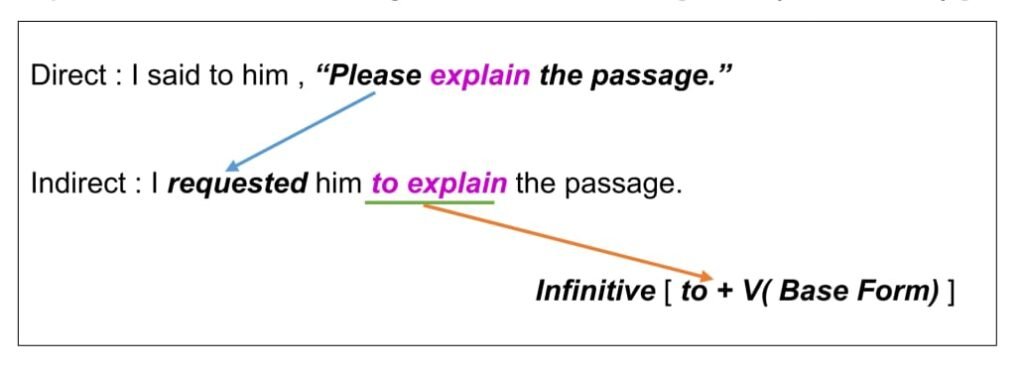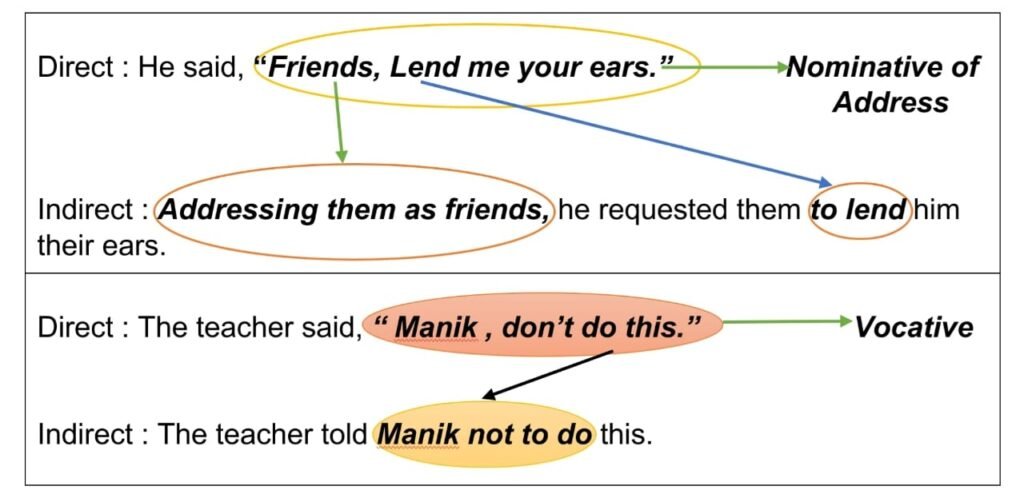Discover how to change Direct and Indirect speech of Imperative sentences into statements, maintaining proper punctuation. In addition, get the use of reporting verbs, change word order, and at the same time use appropriate tone to convey the meaning of the original sentence for the direct and indirect speech of Imperative sentences.
Imperative Sentence
An imperative sentence is a type of sentence that gives a command or makes a request. It typically takes the
form of a subjectless verb, and the tone is often forceful, direct, and commanding. For examples,
- “Close the door.”
- “Please pass the salt.”
Identify Imperative Sentences to Change Direct Speech to Indirect Speech.
(a) Basically, the subject will be “you” and it is not written in the sentence, but it remains in understood condition.
(b) On the other hand, such sentences imply someone to advise, to order, or to request.
Examples:
- Direct: Mother said to me, “(You) Don’t run in the sun.”
- Indirect: Mother advised me not to run in the sun.
- Direct: Bina said to me, “Bina said to me go and fetch a glass of water.”
- Indirect: Bina told (asked/ordered/requested) me to go and fetch a glass of water.
Verbs with Imperative Sentences from Direct to Indirect Speech.
An imperative sentence always indicates a command, request, or advise. In order that we have to use appropriate Verbs according to command, request, or advise. A list of verbs used to change direct speech into indirect speech provides in the table below:
| Verbs of Command: | tell, order, command, change, bid, require. (‘Forbid’) is the negative verb of command. |
| Verbs of Request: | ask, request, desire, beg, solicit, beseech, pray, entreat, implore. |
| Verbs of Advice: | advice, exhort, urge, persuade. |
| The most used Verbs are: | Tell and ask. |
Another key point is that ‘Tell’ may often be used to express a ‘request’, ‘order, or ‘command’. As a result, it is often safer to use ‘tell’ in the indirect form when there is doubt about the proper word to introduce the Reported Speech.
People also Search:
Rules: Direct and Indirect Speech of Imperative Sentences.
In indirect narration imperative sentence rules, the introductory or the Reporting Verb of an Imperative sentence expressing command, request, or desire transforms into an appropriate verb that expresses the intended meaning – tell, ask, request, order, command, beg, entreat, advise, implore.
Rule 1:
First, look at the sentence given in the reported speech under Direct Narration.

Rule 2:
In Indirect Narration, the Verb of the Reported Speech in an Imperative Sentence is changed into the Infinitive [ to + V( Base Form) ]

Rule 3:
If the Reported Speech is Negative, the word “ not ” is used in Indirect Narration before the Infinitive ( not + to )

Rule 4:
Expressions like ‘Please, Sir, Madam, etc are omitted in Indirect Narration, and their sense is expressed by adding adverbs like ‘politely’, ‘kindly’, ‘respectfully’, etc.

Rule 5:
A Nominative of Address or a Vocative is omitted in indirect narration. The verb is followed by the person addressed and the Infinitive.

Rule 6:
When “Let” in the Direct Speech expresses a Proposal or Suggestion we may use “Should” or “Let” and change the Reporting Verb into proposing or suggest. [ It indicates Proposal or Suggestion]
When the Plural Form of Pronouns ( us etc ) is used after “Let”, [ Infinitive ( to + V)] is not used in Imperative Sentences beginning with “ Let.”

Rule 7:
But when “ Let ” does not express a proposal, it should be changed into might or might be allowed to or into some other form and the Reporting Verb in Indirect Speech might be a wish, request, told, ordered, say, etc. according to the meaning or sense of the sentence.
[ It does not indicate Proposal or Suggestion When Singular Form of Pronoun ( me, him, etc ) is used after “Let” ] [ Infinitive ( to + V) is not used in Imperative Sentence beginning with “ Let.”

Rule 8:
Changes of Persons in indirect narration have already been discussed on the previous page. Should be carefully studied.
Rule 9:
Changes in Reporting Verb in Indirect Narration and the Verb of the reported speech in indirect narration also have been discussed in the General Rules section on the previous page. Should be carefully studied.
Direct and Indirect Speech Imperative Sentences Examples 2024
Note carefully the Changes in Imperative Sentences from Direct Speech to Indirect Speech.
Direct: Father said to me, “Go home at once.”
Indirect: Father ordered me to go home at once.
Direct: The teacher said to me, “Don’t come here.”
Indirect: The teacher ordered me not to go there. Or, The teacher forbade me to go there.
Direct: He said to me, ‘Please open the door.”
Indirect: He requested me to open the door. Or, He told me politely to open the door.
Direct: He said to me, ‘Please wait here till I return.”
Indirect: He requested me to wait there till he returned.
Direct: I said to him, “Please explain the passage.”
Indirect: I requested him to explain the passage.
Direct: mother said to him, “Don’t run in the sun.”
Indirect: The mother advised him not to run in the sun. Or. Mother forbade him to run in the sun.
Direct: He said, “Ram, go there.”
Indirect: He told Ram to go there.
Direct: He said, “Friends, lend me your ears.”
Indirect: Addressing them as friends, he requested them to lend him their ears.
Direct: He shouted, “Stop, you villain !”
Indirect: He shouted to the villain to stop. Or, He ordered the villain to stop. Or, Calling the man a villain, he ordered him to stop.
Narration of imperative sentences exercise and Answers
Change the narration from direct to indirect speech
Direct: “Shut the window,” she commanded.
Indirect: She commanded to shut the window.
Direct: “Please bring me a glass of water,” he requested.
Indirect: He requested to bring him a glass of water.
Direct: “Don’t touch that,” she warned.
Indirect: She warned not to touch that.
Direct: “Help me with this assignment,” he asked.
Indirect: He asked for help with that assignment.
Direct: “Pass me the salt,” she said.
Indirect: She asked to pass her the salt.
Direct: “Please don’t disturb him,” she requested.
Indirect: She requested not to disturb him.
Direct: “Open the door,” he ordered.
Indirect: He ordered to open the door.
Direct: “Don’t be late for the meeting,” she advised.
Indirect: She advised not to be late for the meeting.
Direct: “Pass me the book,” he requested.
Indirect: He requested to pass him the book.
Direct: “Don’t forget to call me tomorrow,” she reminded.
Indirect: She reminded not to forget to call her the next day.
Imperative Sentences Narration Change Examples with ‘Let’
Direct: “Let’s go to the park,” he suggested.
Indirect: He suggested going to the park.
Direct: “Let her finish the presentation,” she proposed.
Indirect: She proposed that she finish the presentation.
Direct: “Let’s not waste any more time,” he insisted.
Indirect: He insisted on not wasting any more time.
Direct: “Let me help you with that,” she offered.
Indirect: She offered to help with that.
Direct: “Let’s have dinner together,” he suggested.
Indirect: He suggested having dinner together.
Direct: “Let’s not forget to send the email,” she reminded.
Indirect: She reminded not to forget to send the email.
Direct: “Let him borrow your book,” he suggested.
Indirect: He suggested allowing him to borrow your book.
Direct: “Let’s finish the project by Friday,” she urged.
Indirect: She urged to finish the project by Friday.
Direct: “Let’s try a different approach,” he proposed.
Indirect: He proposed trying a different approach.
Direct: “Let’s take a break,” she suggested.
Indirect: She suggested taking a break.
Workout Examples of Imperative Sentences
Direct: I said to him, “Excuse me, sir.”
Indirect: I begged him to excuse me.
Direct: I said to him, “Let us have some music.”
Indirect: I proposed or suggested to him that we should have some music.
Direct: He said to his companions, “Let us not miss this chance.”
Indirect: He proposed (suggested) to his companions that they should not miss that chance.
Direct: We said, “Let him tell the story.”
Indirect: We said that he might (or might be allowed to) tell the story.
Direct: She said, Let him eat whatever he likes.”
Indirect: She said that he might (or might be allowed to) eat whatever he liked.
Direct: He said, “Let me come in.”
Indirect: He requested that he might be allowed to come in.
Exercises: Direct and Indirect Speech of Imperative Sentences
Change the following from Direct to Indirect Speech of Imperative Sentence
1. He said to me. “Put out the light.”
2. Mother said, “Don’t idle away your time.”
3. The beggar said to the man, “Please help me with money.”
4. The teacher said, “Boys, don’t make noise in the class.”
5. “Be not afraid, noble prince”, said the philosopher.
6. The old man said, “Take care of yourself, little girl.”
7. He said to me, “Let me do my work.”
8. He said, “Lie down, Tom.”
9. He said, “Oil your own machine.”
10. The general said to his troops, “Capture the fort.”
11. The teacher said to me, “Don’t read so fast.”
12. The girl said to the woman, “Please excuse me, madam.”
13. Kaberi said to Raman, “Let me live in peace.”
14. He said, “Let me have my own way.”
15. The thirsty man said to the woman, “Bring me a glass of water.”
16. Mother said to the boy, “Come here soon.”
17. You said to me, “Follow me cautiously.”
18. He said to you, “Don’t look behind.”
19. Madam said to Della, “Take off your hat.”
20. Father said to Casabianca, “Do not leave the deck till I come back,”
Worksheet Imperative Sentence
Turn the following sentences into Indirect Speech :
(1) Father said, My son, “Don’t give up hope.”
(2) Mother said to the daughter, “Get ready to receive the guests.”
(3) The sergeant said to the constables, “Run after the miscreants.”
(4) The boy said to the pedestrian, “Please help me to get out of the trap.”
(5) The teacher said to the boys, “Read silently.”
(6) The secretary of the club said to the members, “Let us raise a fund to help flood victims.”
(7) The students said, “Let us play a friendly football match.”
(8) The grandmother said to the grandchildren, “Let me tell you a folk tale.”
(9) He said, “Let me do this sum.”
(10) You said to me, “Let me go with you.”
(11) She said, “Let me try it again.”
(12) They said, “Let us pray for Mother Teresa.”
(13) The monk said to us, “Give up bad habits.”
(14) Father said to me, “Do not tell a lie.”
(15) The master said to the servant, “Pack up the things in the bag.”
(16) The girl said to her mother, “Please forgive me for my misbehavior.”
(17) You said to me, “Let us take a holy dip in the Ganges.”







